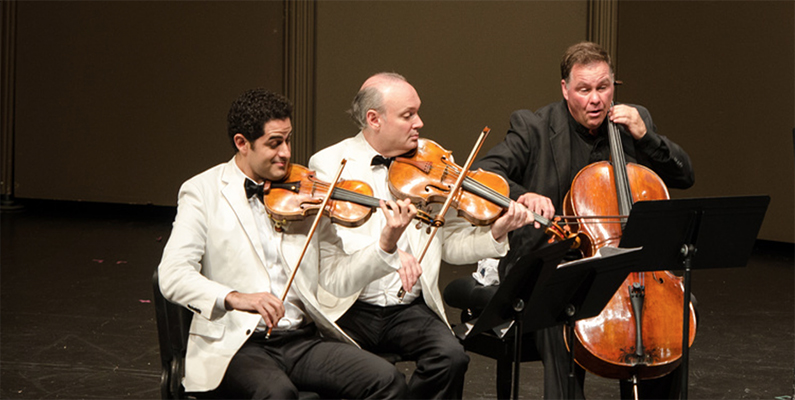
RUSSIANS’ NEW MUSICAL PERMUTATIONS
MENLO PARK, CA—With the chamber concert focused on 19th-century St. Petersburg, Russia, you expected Tchaikovsky and Rimsky-Korsakov. Instead, the focus was on lesser names having great ideas, especially in innovative instrumental combinations.
Glinka, Balakirev and Arensky. Not exactly household names—more likely, a Russian law firm. Their style and textures offered few surprises, but their instruments were innovative. How about Anton Arensky’s string quartet, with the second violin replaced by a second cello, immediately placing the spotlight on low notes? And Mikhail Glinka’s unorthodox Trio, this time with clarinet, bassoon and piano? And Mily Balakirev, the one we know from window-shattering piano works, producing an odd octet, with three winds and four strings plus piano?
Add to it a posthumous tribute to Tchaikovsky and audacious pieces by Shostakovich, and you have another brilliant instance of programming at the Music@Menlo chamber-music festival unveiled July 21 at the Center for the Arts.
The most familiar of the sounds stemmed from Arensky in his somber funerary tribute to Tchaikovsky in 1894, with the whole middle movement built around variations on the latter’s “Legend.” In addition, the Orthodox funeral mass theme widely quoted by others (Mussorgsky’s “Boris Godunov” Coronation Scene, Beethoven’s “Rasoumovsky” Quartet Op. 59 No. 2) is the variations theme for Arensky’s finale. The use of various lower-voice instruments emphasizes the sense of loss and mourning.
Glinka’s odd clarinet-bassoon trio got a stellar performance from clarinetist Jose Franch-Ballester, backed by Michael Brown’s nuanced piano work. Indeed, the whole evening featured expert musicians—a hallmark of Music@Menlo. As for Balakirev, his tuneful octet was a compositional misfire as the three winds totally and predictably dominated the four strings.
The concert’s high points were the 11 selections from Shostakovich’s 1947 set of “Jewish Folk Songs”—originally in Yiddish, but translated into Russian. The composer was a brave man indeed. Despite the strict artistic regimentation of his Stalin-era Communist overlords, he not only honored Jewish culture, despite the leaders’ clear anti-Semitic tendencies, but also referred to the notorious gulags on the text: “My flame is in the darkness/Your father is in chains in Siberia.” That could have sent him too to the gulag, but for the fig-leaf of the next line of exculpatory text, “Held prisoner by the Tsar.”
At the high point of the three vocalists stood the widely traveled Russian soprano Lyubov Petrova.
MUSIC NOTES—For the mainline concerts Saturday nights, the start time is unusual—6 pm instead of the otherwise prevalent 7:30…Heard again in supporting roles were the artistic directors David Finckel on cello, Wu Han on piano.
Music@Menlo, a chamber music festival in its 16th year, through Aug. 4, in two sites: Menlo Park and Atherton, CA. For info: (650) 331-0202, or go online.